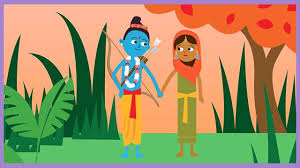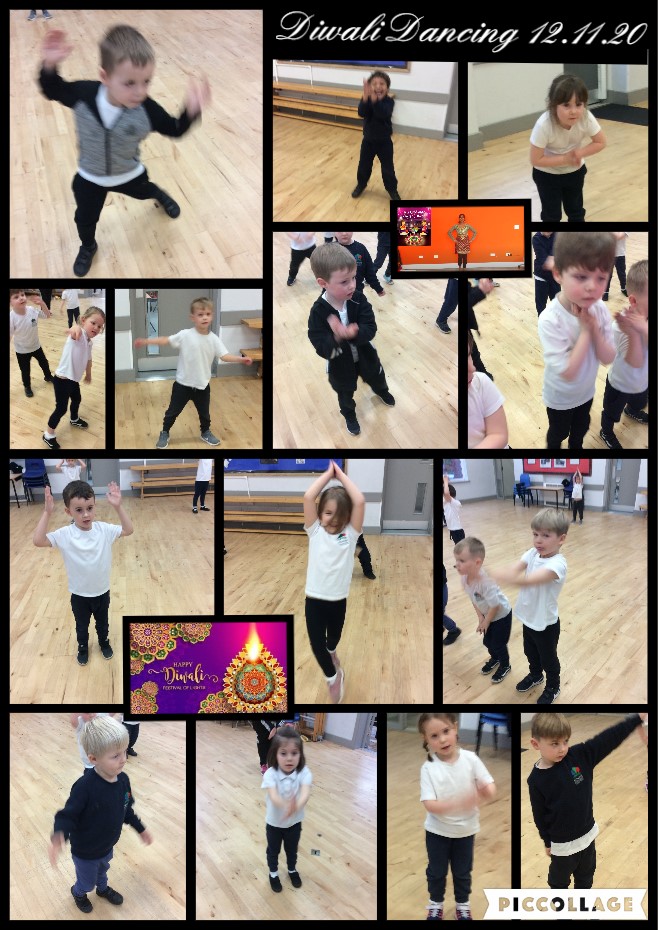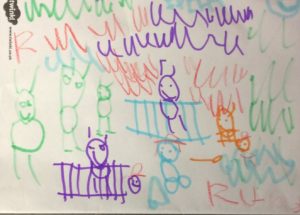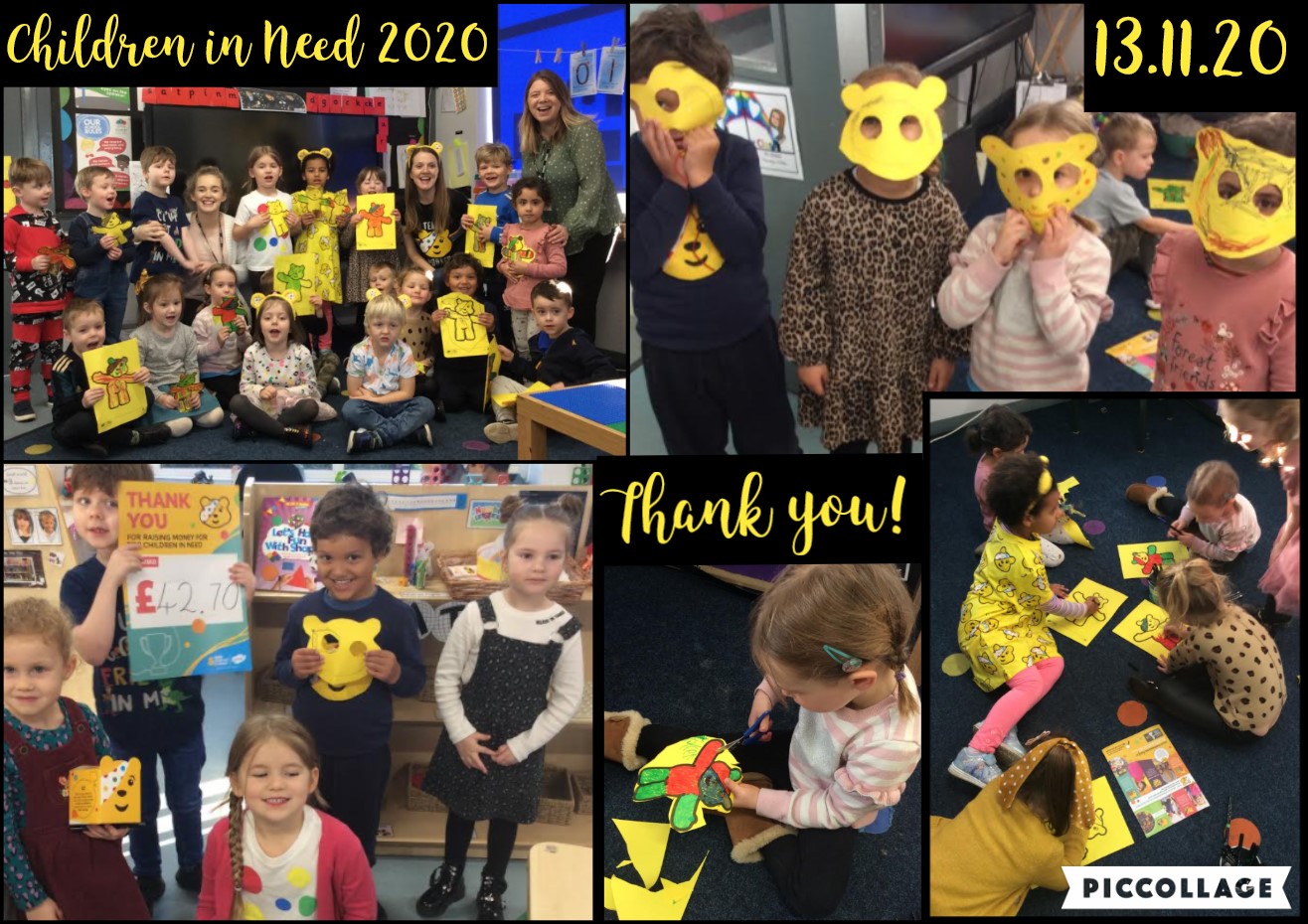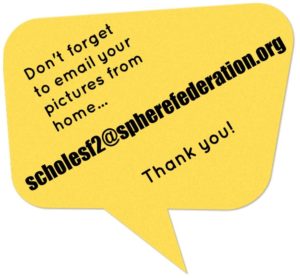World Nursery Rhyme Week
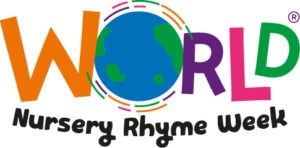
It’s World Nursery Rhyme Week, so we’ll be singing lots of rhymes in Nursery – even more than usual! We know how important Nursery rhymes are for developing early literacy skills; we’re hoping that by the end of the next few weeks, children will be able to confidently sing along to some nursery rhymes or will have learnt some new ones, in addition to those that they already know.
Each year, World Nursery Rhyme Week focuses on 5 rhymes, if you’re not familiar with this year’s rhymes, follow the links below to sing a long at home.
- The Wheels on the Bus
- 5 Little Speckled Frogs
- Hickory Dickory Dock
- Old MacDonald had a Farm
- Miss Polly had a Dolly
*Top tip for watching YouTube with your child: go to the settings cog (it’s along the play bar) and turn off autoplay – this avoids an inappropriate clip coming up automatically, and helps to discourage your child from passively watching clip after clip.
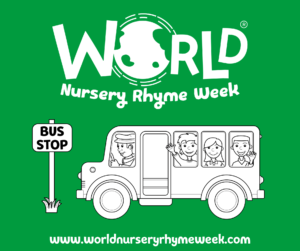
In Nursery this week, lots of our areas of provision are linked to these rhymes, as well as some other favourites. We have Twinkle Twinkle Little Stars to sort in our maths area, Baaa Baa Black Sheep printing at the creative table, Humpty Dumpty to try and put back together in the sensory area and 5 Current Buns to make at the playdough table.
What’s your child’s favourite rhyme? Send us an email to let us know and we’ll sing it at Nursery this week.
Living and Learning: I know we are all the same and we are all different
Our learning and learning objective this week:
I accept that my friends and I might have different opinions.
We watched a short clip about working together and came up with a recipe for success:
- Problem solving words
and phrases - Think about your own
experiences of the
problem solving activity - What qualities are
important? - How might someone
express their views and
opinions successfully
when working as a team?
Here is a photo that summarises our discussions:

Monday – Odd Socks Day
Don’t forget to wear odd socks on Monday 16 November.
Our busy week of learning, celebrating and remembering…
Another busy week here in Reception! We posted about our Remembrance Day activities on Wednesday. We’ve also been celebrating…
Diwali
Understanding the World: People and Communities: Early Learning Goal; Children… know about similarities and differences between themselves and others, and among families, communities and traditions.
We had some fantastic Diwali home-link emails last weekend. Thank you and well done to the children in Sunshine and Rainbow Class who watched the video and shared what they had learnt with their friends.
When we looked at the festival, we shared our knowledge and made links to some celebrations we already know:
“It is The Festival of Light”- Perla
We noticed that during Diwali, there are special meals, people spend time with their family and people give and receive presents. We discussed other celebrations that have similar traditions:
“Christmas!”- Edward
We’ve been colouring and decorating Rangoli patterns, making Rangoli patterns with coloured rice, carefully painting Mehndi patterns on hand outlines and writing Diwali cards. We learned the story of Rama and Sita and that the festival represents good (light) winning over evil (darkness)
The children really enjoyed Diwali dancing in PE on Wednesday. The first dance used dance moves to journey through the five days of Diwali. If your child would like to revisit this at home, you can find the link here
Our final traditional tale (which also links to the final week of our current focus number-3), was The Three Billy Goats Gruff. As well as story-telling and story mapping, the children have been thinking about materials…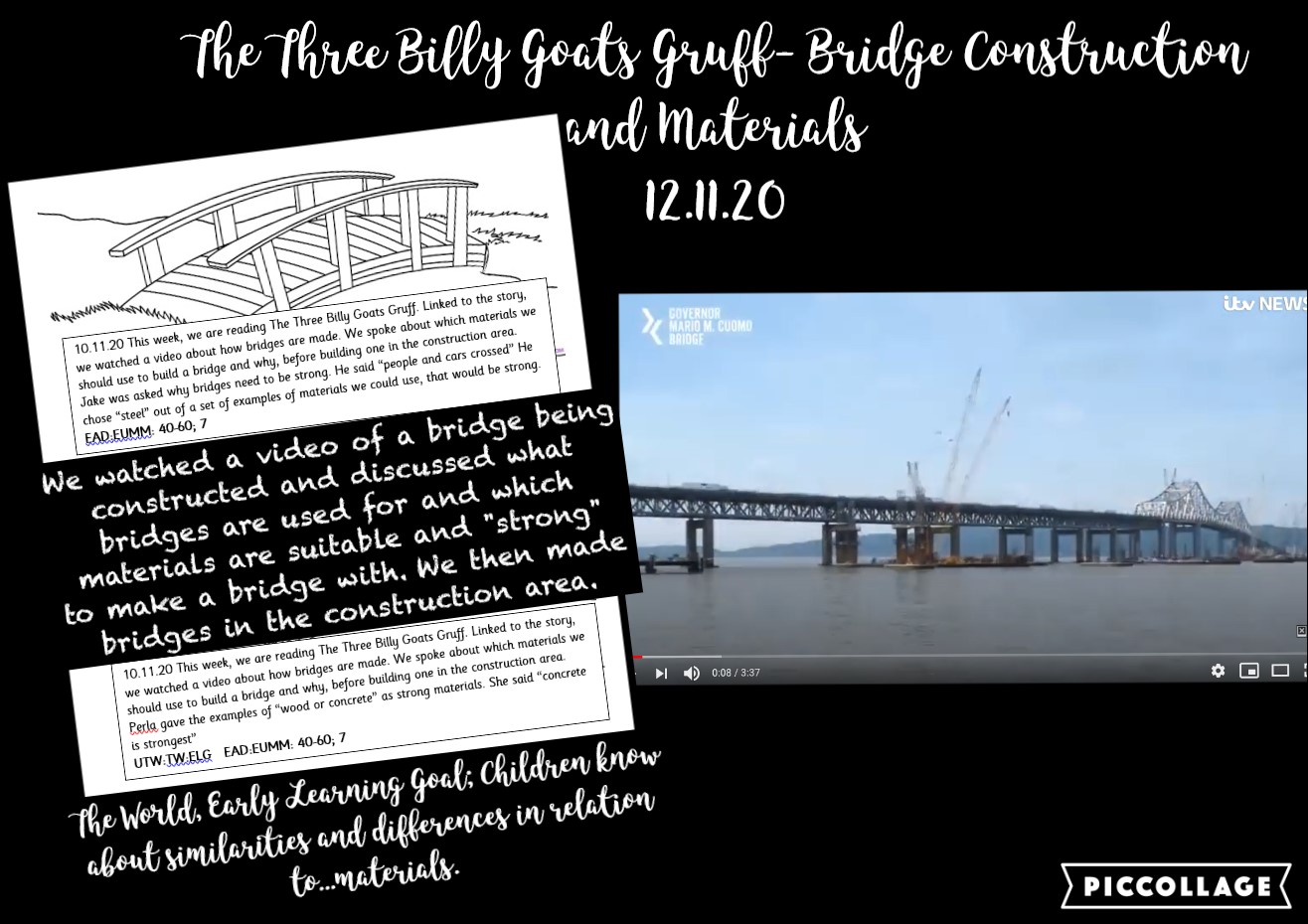
Children in Need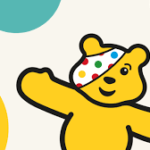 A HUGE thank you for your donations and participation in our Children in Need celebrations. Today, the children have enjoyed…
A HUGE thank you for your donations and participation in our Children in Need celebrations. Today, the children have enjoyed…
Reminder: Next week is Anti-bullying week.
On Monday 16th November we’re asking children to join in with Odd Socks Day, celebrating our differences and that we are all unique. We’ll also be talking to the children about what makes us special and how we respect the differences of others.
Home-Link Challenge
Next week is also World Nursery Rhyme Week . In class, our provision will be based around well-known nursery rhymes. Nursery rhymes are so important for early development in Literacy. They help with sequencing, re-telling narratives and hearing rhyme (a really important skill for phonological awareness for reading and writing)
We’d like you to practise telling or singing a nursery rhyme of your choice with your child. These should be easy enough to find online or just practise ones you already know. We’d like the children to feel confident enough to perform these in front of their friends in a little show (if they want to)
Your child might also like to draw a picture of their chosen rhyme, for a classroom display.
Space bears and spotty bears!
We loved reading ‘Whatever Next‘ this week and have been using our story props to re-tell the story. In the creative area, we worked together to create a giant rocket with control buttons and engines to help it blast off to the moon – just like Baby Bear! We also drew lots of aliens with multiple eyes, legs and antennae.
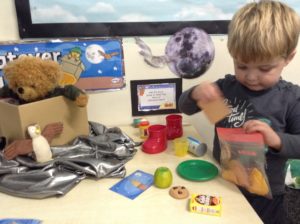
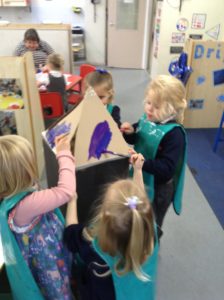
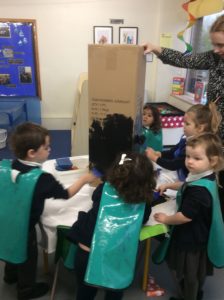
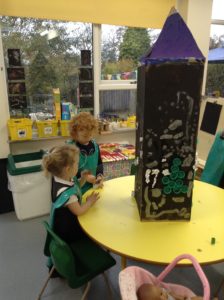
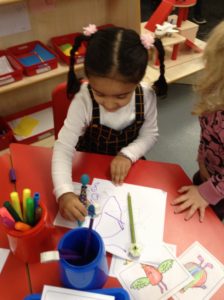
Children loved the jumping aliens in our fiddly fingers area. It was very tricky to push them down until they popped! We also made space hats using colanders and pipe cleaners.
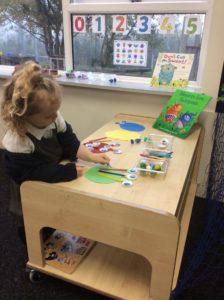
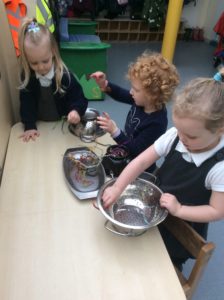
In our space small world area, the children wanted to make it darker so that they could see the stars from our light projector. They helped to make a dark den and enjoyed looking at books and the stars underneath the dark sky.
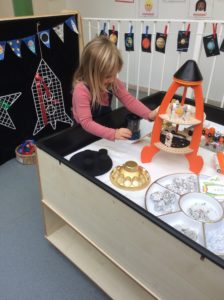
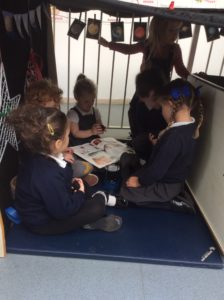
Children have been getting much better at sorting objects and suggesting different ways that they can be sorted, such as by colour or size. We’ll continue this next week using some twinkly stars as part of World Nursery Rhyme Week. Look out for a post on Sunday with more details about the rhymes that we’ll learn.
Children in Need
Thank you for your generous donations for Children in Need. We enjoyed lots of ‘Pudsey Bear’ themed spotty fun, including eating bear shaped toast at snack time!
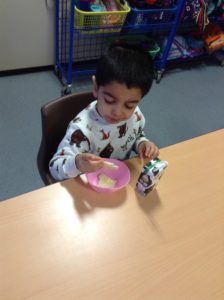
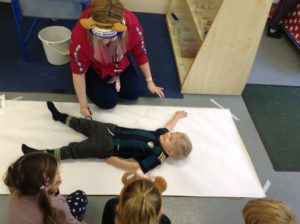
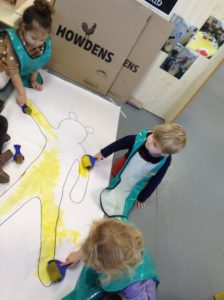
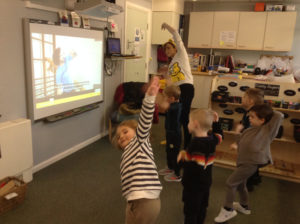
Parent Teacher Consultations
Thank you to everyone who has joined a meeting so far. We just have a few left that have been rearranged for next week. Please get in touch if you have any further questions.
Reminders
- ‘Odd Socks Day‘ – Nursery children can join in with school’s ‘Odd Socks Day’ if they wish. It is part of Anti Bullying Week and helps to provide a talking point to celebrate our similarities and differences. Children need to wear their usual nursery clothing, just with odd socks!
- Children must have a NAMED water bottle at Nursery every day. Please ensure that your child’s name is clearly visible as we have some duplicate bottles.
- The new menus with more hot lunch options have been popular this week. Have a look at the new menus and see if your child would like to try them instead of a packed lunch one day.
Children in Need in KS1
Thank you to everyone that brought a donation into school today. The total will be announced next week.
To celebrate Children in Need in Years 1 and 2 we kept active all day. We watched the end of Joe Wick’s 24 hour exercise challenge. The children were amazed to hear that he raised over £1,500,000 exercising for 24 hours.
1/2 V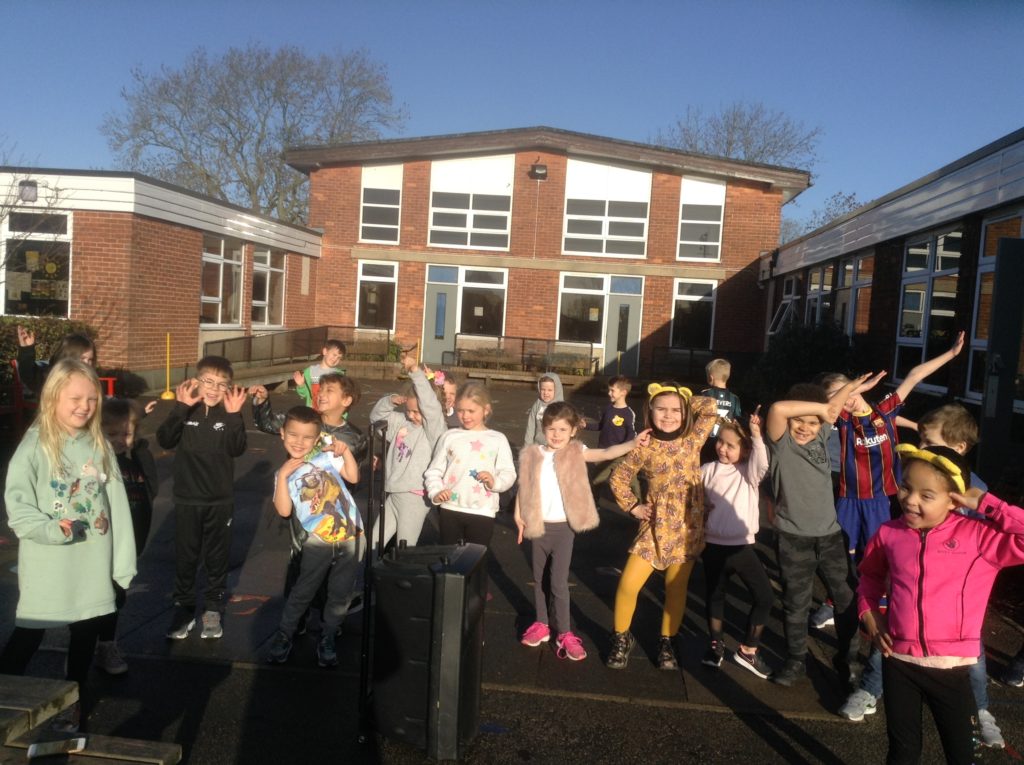
1KN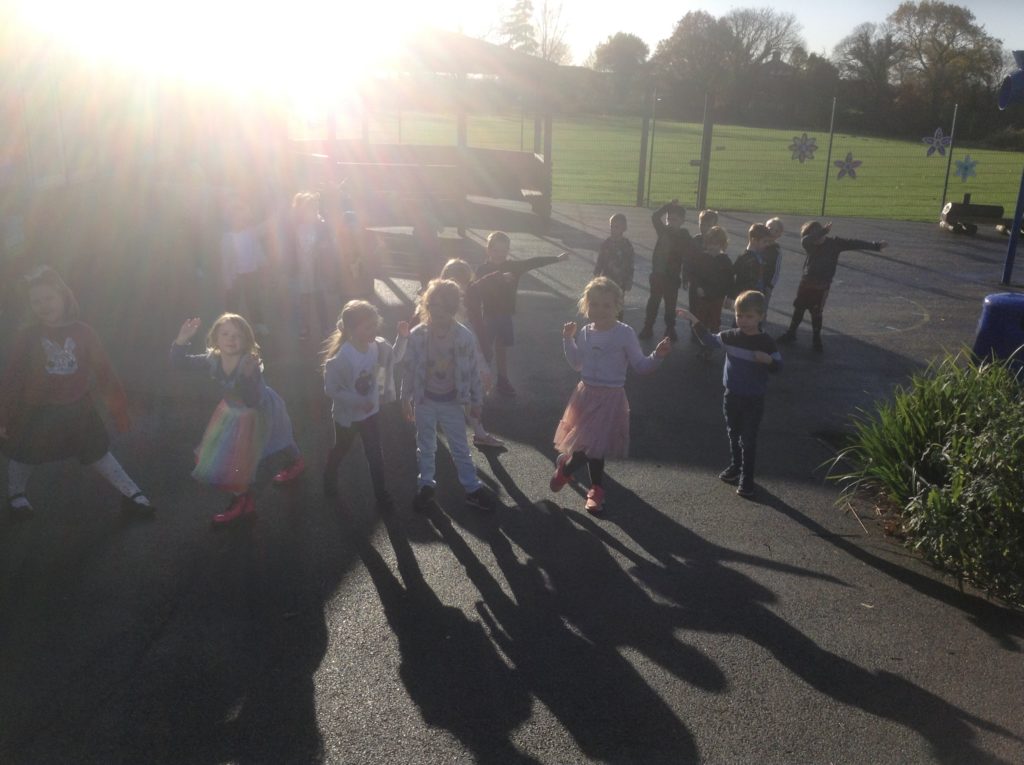
2C 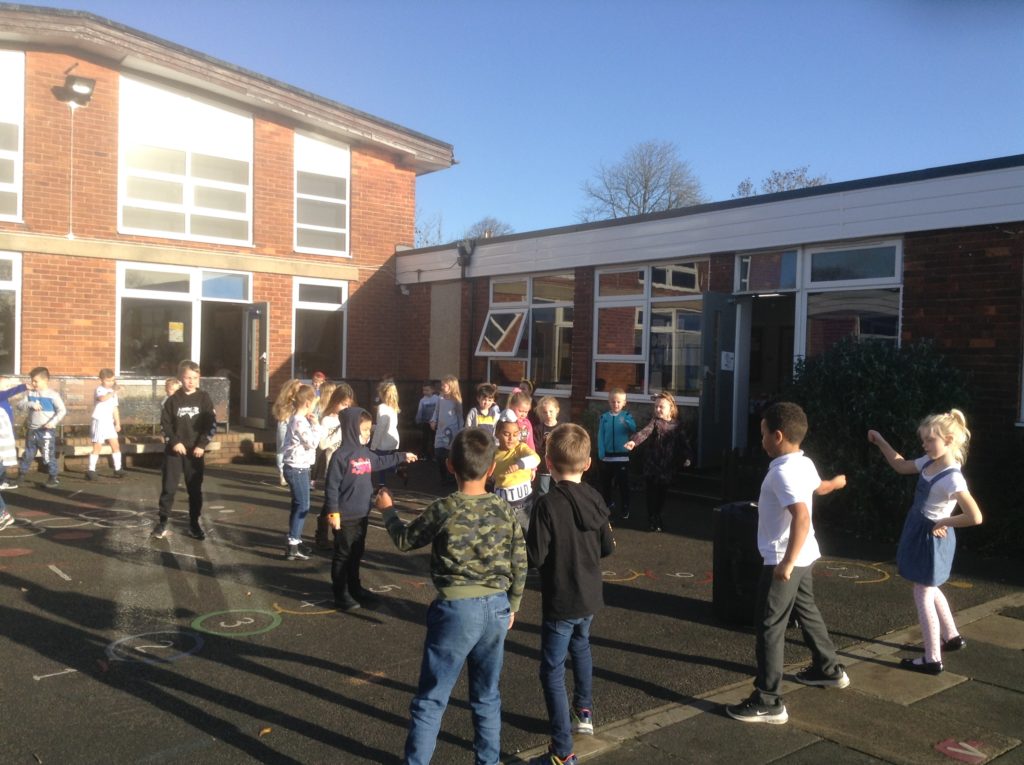
Joe Wicks in 1KN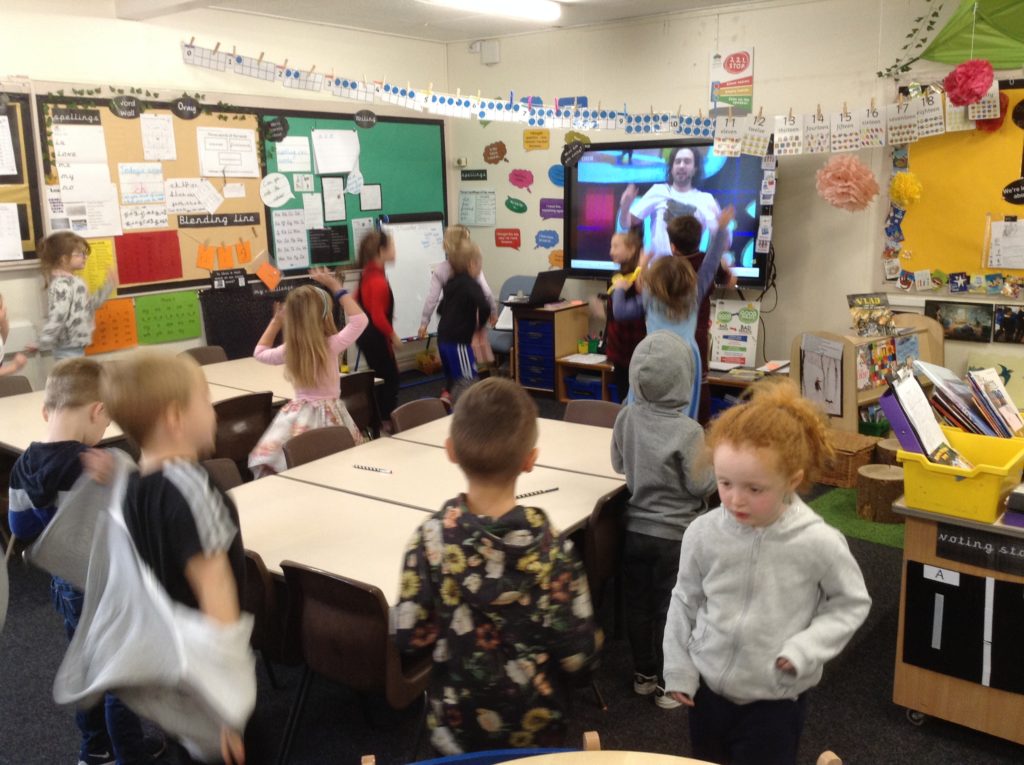
1KN certificate celebration

Another great week in 1KN. Our certificates this week go to…
For great learning…
Parker – You have made so much progress in reading and it is a pleasure to listen to you read books fluently. Well done.
For sport and physical activity…
Alex – Great wake up shake up dancing every day. You always give it 100%.
For living and learning…
Shay – You have been resilient this week. You are trying your best to finish a piece of work even when you find it difficult. Well done!
5/6B Certificate Celebration
Here are our certificate winners this week:
For great living and learning…
Zoe – You understand that we are all the same and we are all different. You express and articulate your views really well, standing up for equality in all aspects. During Newsround, you were very vocal about the point of girls football academies shutting during lockdown and boys being allowed to continue. This is the kind of issue we want pupils to identify and express their views on. Great job, Zoe!
For sport and physical activity…
Joe – In our basketball session, you demonstrated good tactics, movement skills and coordination in a small-sided game. You worked very efficiently with others and you have a fantastic competitive spirit! Well done, Joe!
For great learning…
Daniel B – Your teachers have seen a huge shift in the amount of work you are doing. Your learning knowledge has improved and you are giving 100% effort in everything you are doing. Great work, Daniel – keep it up!
Celebration certificates 1,2V
We have had another busy week! Our certificates this week go to…
For great learning…
Sophia – For great work in maths. You have concentrated well and shared your ideas.
For sport and physical activity…
Edward – For determination in PE – trying to beat your skipping personal best.
For living and learning…
Tilly – For always being helpful and kind.
Our new class reward system is going down well too. For making good choices throughout the day, children can write their name on a raffle ticket (some children have got 8 tickets in this week). On a Friday, 5 winners will be drawn out and can choose a prize from the Raffle Reward box.
5/6 S Certificate Celebration
This weeks certificate winners are…
For great learning…
Sonny- for becoming a more willing writer. You put so much effort into your persuasive piece of writing and your use of vocabulary was brilliant. Well done and keep it up!
For sport and physical activity…
Abi- for progressing well with your hockey skills. You now have much more control and skill. Well done!
For living and learning…
Matilda- for contributing so maturely to the class discussion about stereotypes. Well done.
Well done everyone!
